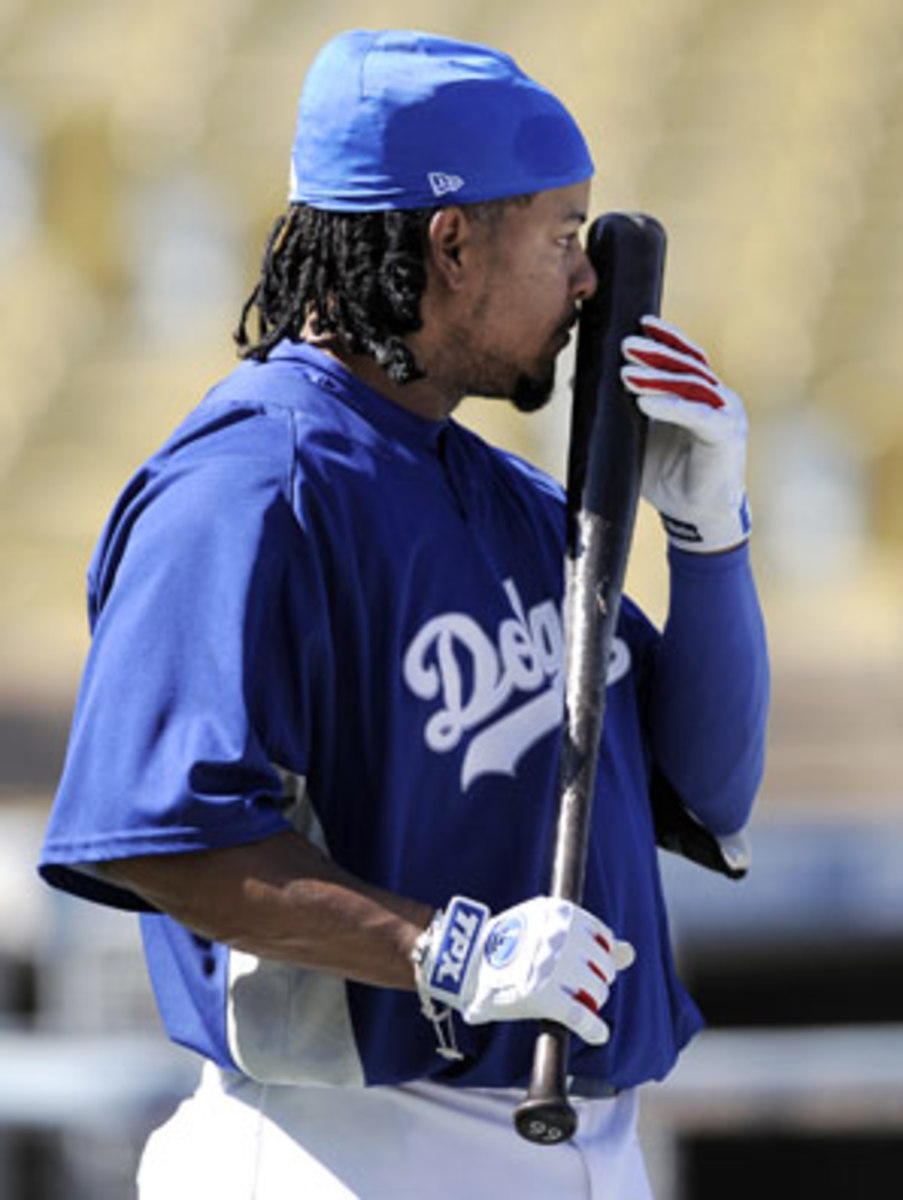
Manny and the Dodgers: Just a fling or a long-term relationship?
Manny Ramirez looked jarringly preppy in a gray, argyle-style V-neck as he stood outside the Dodgers clubhouse not long after his Game 1 destruction of the Cubs in the NLDS last week.
He didn't look like his rumpled on-field self at all: He was polished, with dreads cut neatly. And then it happened ... his inner Mr. Magoo materialized. Manny emerged in a corridor of Wrigley Field, but he wasn't looking for the Dodgers' team bus. He wanted a taxi to take him wherever Manny likes to go -- outer space, perhaps. As the attendant explained, the streets were closed off, and it wasn't a hot idea for Manny to stroll a block away for a ride. Manny looked perplexed, as if the idea of hailing a cab amid lingering, beer-drinking Cubs fans never struck him as problematic.
"Someone will call a cab for you," the attendant said.
"Where do I wait?" Manny politely asked. "Which way do I go?"
Right now, direction is not a real issue for Manny: He is carrying the Dodgers on a non-stop joy ride straight to the NLCS to play the Phillies in Game 1 on Thursday. "I've seen guys get hot," said Dodgers third base coach Larry Bowa. "I've seen Alex [Rodriguez] get hot. I've seen Mike Schmidt. I know Manny, free-agent-to-be, is playing for a contract, and he's trying to erase things written about him from the past, but I've never seen anything like what Manny is doing for this long a period of time."
But when the organ music stops, where does the hitting savant wind up? Manny has been essentially a sugar rush, a hit of adrenaline for the Dodgers that feels so good until it doesn't, until the reality of his age (36) and impatience over his zaniness (see Boston) start to set in. Dodger fans only know the first-date high of the lovable Manny, and most of them believe a five-year deal for $100 million or so is the least the team can pay for the giddiness they feel now. There might be four other teams interested in Manny, too, but at four or five years, for around $25 million per season?
A year ago, hedging on Manny would be an easier call for a big-market team. But baseball isn't impervious to the tangible and psychological wear of a spiraling economy or the blowback of a public angry at excess. "I think historically there has been a disconnect (between sports and the economy), but that disconnect is waning," said Andrew Zimbalist, an economist and longtime author on the business of sports. As he explained, the new-stadium craze that began with Camden Yards in 1992 created a money-making model for teams that longed to cash in on the corporate fan by moving their clubs to gentrifying downtowns, to the heart of cities' financial districts. Ticket prices rose, luxury boxes were built, the high-end advertiser came aboard and player salaries soared to CEO levels. In many ways, Wall Street and Yawkey Way became intertwined.
This season, in the year of the vanishing financial icon, as job losses add up and consumer confidence is plunging, baseball has watched the dark mood trickle down: For the first time in four years, overall attendance dropped, with one million fewer fans in the seats in 2008. And last week commissioner Bud Selig rightly warned owners not to get "cocky" in pricing tickets out of reach in times of economic stress.
Luxury items aren't as cool as they once were. Vanity purchases aren't as embraced as they used to be. Which brings us back to Manny. Whether a team can afford to overpay for a hitter who, by the end of his ideal deal, will be 41, isn't the issue as much as will they do it.
Will the current economy draw a line on stupid money in baseball? Will the success of small-market, coupon-clipping teams like the Rays, without a Manny among them, put an end to ridiculous excess? Not completely, but it might make a team -- even a Dodgers organization steeped in Mannywood hysteria -- think seriously before buying stock in Ramirez's future.
He hasn't changed forever, just for the moment. At this instant he's a perfect fit for the Los Angeles crowd draped in Dodger blue: He's always sunny and as loose as Malibu beach sand. He has also been devastatingly good since he arrived in July from his disgruntled stay in Boston. "I can honestly say, there isn't one thing -- and I can get picayune sometimes -- that I'm displeased about with Manny," said Bowa, who watched Ramirez hit .500 against the Cubs last week, with two home runs and four RBIs in three games. "I saw him when I was with the Yankees and he'd do stuff and you'd say, 'Oh god.' But he has been a model citizen. He plays hard, runs hard, works hard."
In the past, Manny might have turned his makeover of argyle-sweater proportions into a record-breaking bounty built upon the sucker's nature of a big-market team. Certainly the Dodgers will be under pressure from their love-struck fans to do whatever it takes to keep Manny, but restraint is the new financial strategy in, of all places, baseball. The Dodgers might just heed the hard lessons from what Wall Street has experienced: Greed is bad; quit while you're ahead.





